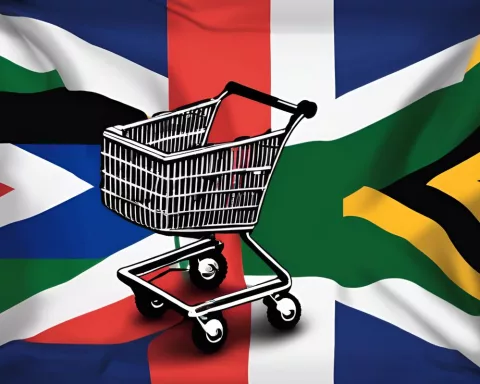The South African Revenue Service (SARS) is making changes to the e-commerce landscape to promote fair competition. Two high-profile Far East businesses, Shein and Temu, have been leveraging the e-commerce atmosphere in South Africa, but SARS’s new policy will overhaul how Customs and Excise handle small-scale orders, which will dramatically influence the pricing structure of these digital storefronts. The change is a counteraction to charges from indigenous South African businesses who allege that Shein and Temu have been manipulating the former law to gain a pricing edge over local retailers.
What changes has the South African Revenue Service made to the e-commerce landscape?
In an attempt to promote fair competition, SARS is altering its strategy towards two high-profile Far East businesses, Temu and Shein. The change, effective from 1 July 2024, will overhaul how Customs and Excise handle small-scale orders, which will dramatically influence the pricing structure of these digital storefronts. This is a stride towards cultivating a balanced, competitive environment in which both indigenous and international businesses can prosper.
SARS’s Strides to Level the Playing Field
In an audacious attempt to promote fair competition, the South African Revenue Service (SARS) is altering its strategy towards two high-profile Far East businesses, namely, Temu and Shein. These corporations have been leveraging the rapidly expanding e-commerce atmosphere in Mzansi. The change, effective from 1 July 2024, will provide a significant overhaul to how Customs and Excise handle small-scale orders, which will dramatically influence the pricing structure of these digital storefronts.
The attention has swiftly veered from the foreseen face-off between e-commerce behemoths such as Takealot and Amazon, to focus on these two eastern enterprises. This reorientation stems from SARS’s novel policy to supervise small-scale orders under R500 entering South Africa. From the proceeding month, these miniature items will be liable to the same duties as larger orders, accruing a 45% import fee plus the value-added tax (VAT).
The Impact on Local Businesses
This change is a counteraction to charges from indigenous South African businesses who allege that Shein and Temu have been unjustly manipulating the former law. These businesses claim that Shein and Temu would fractionate larger orders into smaller units and packages, consequently minimizing the customs fees and taxes payable upon their landing.
These downsized packages would then be reconstructed into their initial order and dispatched to the customer, giving these foreign firms a pricing edge over local retailers. This strategy has garnered criticism from industry experts who contend that it subverts the South African retail industry.
The executive director of the National Clothing Retail Federation (NCRF), Michael Lawrence, has voiced concerns regarding the overseas e-commerce services neglecting to pay the relevant duties and VAT on their imports. He asserts, “Our national income and local manufacturers bear the brunt”. This sentiment resonates with numerous South African retailers who feel that they have been unjustly disadvantaged.
The Response from Major Players
For example, The Foschini Group (TFG), which operates its digital retail platform known as Bash, has been working in conjunction with SARS to rectify this issue. Anthony Thunstrom, the CEO of TFG, depicts SARS’s imminent move as a crucial step towards protecting the South African clothing retail sector.
In retaliation, Temu and Shein have clarified that the advertised prices of their commodities do not include import duties and taxes. These are levied by local authorities upon the arrival of the package. Shein further confirmed that it adheres to the World Customs Organisation Harmonised System (WCO HS) codes when declaring items through local agents and that its orders are not granted any tax preferences.
The Way Forward
The looming policy modification mirrors SARS’s commitment to endorsing fair competition in the e-commerce sector. While it may lead to escalated prices on these foreign platforms, it aids in safeguarding and nurturing local businesses, which hold a pivotal role in contributing to South Africa’s economy. It also underscores the significance of complying with local tax rules and regulations, a principle that every corporation operating within the country should honor.
In summation, while this policy alteration will certainly revolutionize the e-commerce landscape in South Africa, it is ultimately a stride towards cultivating a balanced, competitive environment in which both indigenous and international businesses can prosper.
1. What changes has the South African Revenue Service made to the e-commerce landscape?
SARS is altering its strategy towards two high-profile Far East businesses, Temu and Shein, effective from 1 July 2024. It will overhaul how Customs and Excise handle small-scale orders, which will dramatically influence the pricing structure of these digital storefronts, in an attempt to promote fair competition.
2. Why is SARS making changes to the e-commerce landscape?
SARS is making changes to the e-commerce landscape to promote fair competition and counteract charges from indigenous South African businesses that allege that Shein and Temu have been manipulating the former law to gain a pricing edge over local retailers.
3. How will the changes affect small-scale orders?
From 1 July 2024, small-scale orders under R500 entering South Africa will be liable to the same duties as larger orders, accruing a 45% import fee plus the value-added tax (VAT).
4. Why are local businesses concerned about Shein and Temu’s business practices?
Local businesses alleged that Shein and Temu would fractionate larger orders into smaller units and packages, consequently minimizing the customs fees and taxes payable upon their landing, giving these foreign firms a pricing edge over local retailers.
5. What is the response from major players like TFG?
The Foschini Group (TFG), which operates its digital retail platform known as Bash, has been working in conjunction with SARS to rectify the issue. Anthony Thunstrom, the CEO of TFG, depicts SARS’s imminent move as a crucial step towards protecting the South African clothing retail sector.
6. What is the significance of complying with local tax rules and regulations?
Complying with local tax rules and regulations is significant for every corporation operating within the country. It aids in safeguarding and nurturing local businesses, which hold a pivotal role in contributing to South Africa’s economy and endorsing fair competition in the e-commerce sector.












